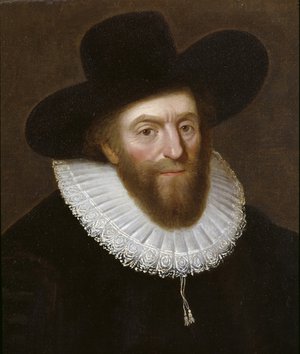
Edward Alleyn
Introduction to the Henslowe-Alleyn Digitisation Project
The Archive of Dulwich College in London, England, holds thousands of pages of manuscripts left to the College by its founder, the eminent actor Edward Alleyn (1566-1626). This archive includes his personal and professional papers and those he inherited from his father-in-law Philip Henslowe (d. 1616). As a group, these manuscripts comprise the largest and most important single extant archive of material on the professional theatre and dramatic performance in early modern England, the age of Shakespeare, Marlowe, Jonson, Middleton, Heywood, Dekker, Chettle, and so many of their contemporaries and colleagues.
Henslowe and Alleyn built and expanded several London public playhouses, including the Rose, the Fortune, and the Hope, the foundations of some of which have recently been discovered or excavated by Museum of London staff. Named by King James I as Joint ‘Masters of the Royal Game of Bears, Bulls and Mastiff Dogs’, Henslowe and Alleyn also staged such blood sports as bull- and bear- and lion-baiting at the Bear Garden and other venues, including royal palaces.
Henslowe and Alleyn commissioned plays from dramatists and ran several of the most successful acting companies of the time, including the Lord Strange’s Men and the Lord Admiral’s Men, for which Alleyn performed such famous roles as Dr Faustus and Tamburlaine. The sole surviving actor’s ‘part’ (or script) from the period, for the play Orlando Furioso, is in the Dulwich archive, as is the ‘plot’ (or prompter's outline) of the play The Second Part of the Seven Deadly Sins, one of only six plots from this period known to survive in part or in whole. In fact, most of what modern scholars know about the early modern English theatre, both as financial enterprise and artistic endeavour, comes from the study of the Henslowe and Alleyn papers at Dulwich College.
The Henslowe-Alleyn Digitisation Project has two aims and objectives: first, to protect and conserve these increasingly fragile manuscripts, and, second, to make their contents much more widely available in a free electronic archive and website, not only to specialist scholars but to all those interested in early modern English drama and theatre history, as well as social, economic, regional, architectural, and legal history, and palaeography and manuscript studies. It is the hope of the Henslowe Alleyn Digitisation Project members that the use of these manuscripts in electronic and digital form will not be confined to students and scholars but to a wide-ranging and ever-changing community of readers in a variety of ways.